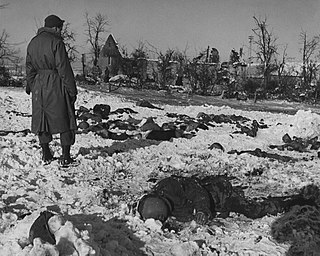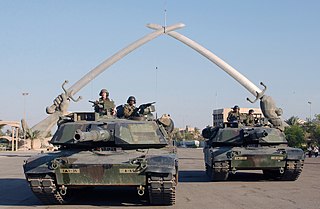Related Research Articles

A war crime is a violation of the laws of war that gives rise to individual criminal responsibility for actions by combatants in action, such as intentionally killing civilians or intentionally killing prisoners of war, torture, taking hostages, unnecessarily destroying civilian property, deception by perfidy, wartime sexual violence, pillaging, and for any individual that is part of the command structure who orders any attempt to committing mass killings including genocide or ethnic cleansing, the granting of no quarter despite surrender, the conscription of children in the military and flouting the legal distinctions of proportionality and military necessity.
Arms control is a term for international restrictions upon the development, production, stockpiling, proliferation and usage of small arms, conventional weapons, and weapons of mass destruction. Historically, arms control may apply to melee weapons before the invention of firearm. Arms control is typically exercised through the use of diplomacy which seeks to impose such limitations upon consenting participants through international treaties and agreements, although it may also comprise efforts by a nation or group of nations to enforce limitations upon a non-consenting country.

An armistice is a formal agreement of warring parties to stop fighting. It is not necessarily the end of a war, as it may constitute only a cessation of hostilities while an attempt is made to negotiate a lasting peace. It is derived from the Latin arma, meaning "arms" and -stitium, meaning "a stopping".

The law of war is a component of international law that regulates the conditions for initiating war and the conduct of hostilities. Laws of war define sovereignty and nationhood, states and territories, occupation, and other critical terms of law.

Non-combatant is a term of art in the law of war and international humanitarian law to refer to civilians who are not taking a direct part in hostilities; persons, such as combat medics and military chaplains, who are members of the belligerent armed forces but are protected because of their specific duties ; combatants who are placed hors de combat; and neutral persons, such as peacekeepers, who are not involved in fighting for one of the belligerents involved in a war. This particular status was first recognized under the Geneva Conventions with the First Geneva Convention of 1864.
The Treaty on the Protection of Artistic and Scientific Institutions and Historic Monuments or Roerich Pact is an inter-American treaty. The most important idea of the Roerich Pact is the legal recognition that the defense of cultural objects is more important than the use or destruction of that culture for military purposes, and the protection of culture always has precedence over any military necessity.

A declaration of war is a formal act by which one state announces existing or impending war activity against another. The declaration is a performative speech act by an authorized party of a national government, in order to create a state of war between two or more states.

Tobias Michael Carel Asser was a Dutch lawyer and legal scholar. In 1911, he won the Nobel Peace Prize for his work in the field of private international law, and in particular for his achievements establishing the Hague Conference on Private International Law (HCCH).

The Hague Conventions of 1899 and 1907 are a series of international treaties and declarations negotiated at two international peace conferences at The Hague in the Netherlands. Along with the Geneva Conventions, the Hague Conventions were among the first formal statements of the laws of war and war crimes in the body of secular international law. A third conference was planned for 1914 and later rescheduled for 1915, but it did not take place because of the start of World War I.
An unconditional surrender is a surrender in which no guarantees, reassurances, or promises are given to the surrendering party. It is often demanded with the threat of complete destruction, extermination or annihilation.

Military occupation, also called belligerent occupation or simply occupation, is temporary hostile control exerted by a ruling power's military apparatus over a sovereign territory that is outside of the legal boundaries of that ruling power's own sovereign territory. The controlled territory is then known as the occupied territory, with the ruling power being the occupant. Occupation is distinguished from annexation and colonialism in that it is a power structure that the occupant intends to keep in place only temporarily. In many cases, the occupant may establish a military government to facilitate the administration of the occupied territory, though this is not a necessary precondition for occupation to take place.
The International law bearing on issues of Arab–Israeli conflict, which became a major arena of regional and international tension since the birth of Israel in 1948, resulting in several disputes between a number of Arab countries and Israel.

The Hague Conference on Private International Law (HCCH) is an intergovernmental organisation in the area of private international law, that administers several international conventions, protocols and soft law instruments.

The Hague Convention for the Protection of Cultural Property in the Event of Armed Conflict is the first international treaty that focuses exclusively on the protection of cultural property in armed conflict. It was signed at The Hague, Netherlands, on 14 May 1954 and entered into force on 7 August 1956. As of July 2021, it has been ratified by 133 states.

War can heavily damage the environment, and warring countries often place operational requirements ahead of environmental concerns for the duration of the war. Some international law is designed to limit this environmental harm.

The Martens Clause is an early international law concept first introduced into the preamble of the 1899 Hague Convention II – Laws and Customs of War on Land. There are differing interpretations of its significance on modern international law, with some scholars simply treating the clause as a reminder international customary law still applies after a treaty is ratified while others take a more expansive approach where the clause provides that because international treaties cannot be all encompassing, states cannot use that as a justification for an action.
Air warfare must comply with laws and customs of war, including international humanitarian law by protecting the victims of the conflict and refraining from attacks on protected persons.
A peace congress, in international relations, has at times been defined in a way that would distinguish it from a peace conference, as an ambitious forum to carry out dispute resolution in international affairs, and prevent wars. This idea was widely promoted during the nineteenth century, anticipating the international bodies that would be set up in the twentieth century with comparable aims.

The Geneva Conventions are international humanitarian laws consisting of four treaties and three additional protocols that establish international legal standards for humanitarian treatment in war. The singular term Geneva Convention colloquially denotes the agreements of 1949, negotiated in the aftermath of the Second World War (1939–1945), which updated the terms of the two 1929 treaties and added two new conventions. The Geneva Conventions extensively define the basic rights of wartime prisoners, civilians and military personnel; establish protections for the wounded and sick; and provide protections for the civilians in and around a war-zone.
References
- 1 2 Graber, Dorothy (1949). The Development of the Law of Belligerent Occupation, 1863-1914: A Historical Survey. New York: Columbia University Press.
- ↑ Narbulsi, Karma (1999). Traditions of War: Occupation, Resistance and The Law. Oxford: Oxford University Press. Chapter 4. doi:10.1093/0198294077.001.0001. ISBN 0198294077 . Retrieved 2 Nov 2022.
- 1 2 "Project of an International Declaration concerning the Laws and Customs of War. Brussels, 27 August 1874". ihl-databases.icrc.org. Archived from the original on 2022-12-23. Retrieved 2024-08-22.
- ↑ "The Nobel Peace Prize 1904".
- ↑ "THE JOINT SERVICE MANUAL OF THE LAW OF ARMED CONFLICT" (PDF). assets.publishing.service.gov.uk. 26 October 2004. Retrieved 22 August 2024.